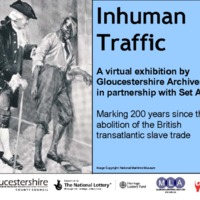
Inhuman Traffic
The Inhuman Traffic project was led by Gloucestershire Archives, in partnership with the Set All Free initiative. The virtual exhibition and accompanying web resource were based on documents held at Gloucestershire Archives and, in particular, the papers of the anti-slavery campaigner Granville Sharp (1735-1813). The exhibition explored topics such as the contribution of black people to the abolition movement, aspects of the legacies of slavery, including racism and domestic violence. Over 400 copies of the exhibition DVD were sent to schools, churches, tourist information venues and individuals across Gloucestershire. The associated programme of events included performances of the play 'Inhuman Traffic', developed in collaboration with a local theatre company, Spaniel in the Works. The play features four interacting characters with different perspectives on slavery. A cross-curricular teaching resource was later developed, which included a second performance, 'Master and Slave', in partnership with Stroud District Museums Service, Spaniel in the Works, and Parliament Primary School, Stroud.
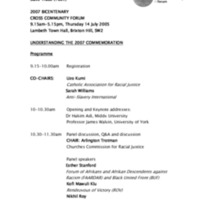
2007 Bicentenary Cross-Community Forum
The main aim of the 2007 Bicentenary Cross-Community Forum (2007BCCF) was to facilitate space for dialogue and alliance building in areas of work connected to the legacies of enslavement, related global injustices today and contemporary forms of slavery. The forum was jointly convened by Rendezvous of Victory, Anti-Slavery International and the World Development Movement. The education initiative aimed to assist in discussion and alliance-building on issues arising from the legacies of African Enslavement such as Maangamizi (Afrikan Holocaust) Awareness, Afriphobia, reparations, global injustices today and contemporary forms of enslavement. Open meetings were held in London between 2005 and 2007, and the group produced the 2007 Cross-community e-bulletin three times a year, including comment pieces about the significance of 2007. Task Action Groups were set up, such as the Cross-Community Dialogue Action Group on Education (CCODAGE), jointly hosted by the Council for Education in World Citizenship and the School of Education at Kingston University. A Global Justice Forum was developed out of the 2007BCCF in order to advance work beyond 2007.
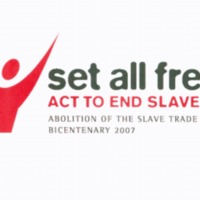
Set All Free: ACT TO END SLAVERY
Set All Free: ACT TO END SLAVERY was a project of Churches Together in England, based in London. It was also a collaboration between church-related groups, societies and organisations around the UK working together with a Christian ethos to assess the relevance of the bicentenary, and in particular the legacies of slavery. The project aimed to highlight how the values of the abolitionists can transform relationships on an individual, community and society level. The project included building a network coalition, campaigning, producing research and resources for churches, schools and individuals. Set All Free also worked closely with Anti-Slavery International and Rendezvous of Victory, a leading African community-led organisation.
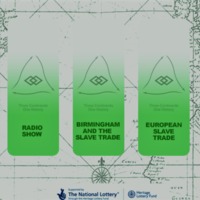
Three Continents, One History: Birmingham, the Trans-Atlantic Slave Trade and the Caribbean
'Three Continents, One History' was a community project led by the African-Caribbean Millennium Centre (ACMC) to explore the historical links between Birmingham, the transatlantic slave trade and the Caribbean. Research focused on themes such as the region's manufacturing history and its links to slavery, the role of local regiments in keeping order on Caribbean plantations, the African presence in the West Midlands, and the region’s role in the abolitionist movement. The project aimed to examine the contemporary relevance of 1807 and the slave trade to Birmingham’s diverse communities, to contribute to a reshaping of the National Curriculum, to establish a physical archive and an interactive website. The research was shared with the public via weekly broadcasts on New Style Radio (a community radio station housed in ACMC) and simulcasts with Caribbean and African radio stations. Other events included conferences, dramatisations and discussion workshops.
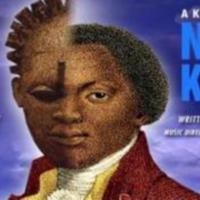
Nobody Knows
Written and directed by Mervyn Weir, 'Nobody Knows' used drama, dance, music and imagery to explore the history of the transatlantic slave trade and its legacy today. Told through the eyes of Olaudah Equiano, the play celebrated the dignity, pride, and spirit of Black people as they fought for emancipation from slavery. In 2007 the play was presented by Krik Krak productions during the Routes to Freedom season at The Drum in Birmingham.
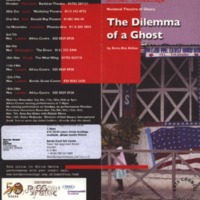
The Dilemma of a Ghost
Written by Ghanaian playwright Ama Ata Aidoo, The Dilemma of a Ghost deals with colliding cultures in 21st century Africa. An African-American woman accompanies her Ghanaian husband as he returns home, but the couple are haunted by ghosts of the inheritance of the slave trade. A collaboration between London theatre company Border Crossings and the National Theatre of Ghana, the production used music and dance to celebrate 50 years of Ghana’s independence and 200 years since the abolition of the transatlantic slave trade. The play was performed in Birmingham, Hull, Leeds, Leicester, London, Plymouth and Slough. The production was was accompanied by a new book from Border Crossings, working in collaboration with Anti-Slavery International. ‘Theatre and Slavery: Ghosts at the Crossroads’ explored the ways in which world theatre responds to key issues in modern society and politics, including the issue of contemporary slavery.
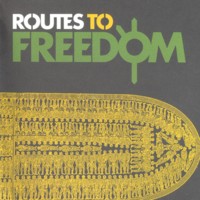
Routes to Freedom
The 'Routes to Freedom' season of events took place throughout Autumn 2007 at The Drum, an intercultural arts venue in Birmingham. The programme explored the struggle for social justice and equality in relation to African, Asian and Caribbean communities, and marked two key historical events and their impact: the bicentenary of the Abolition of the Slave Trade Act and the 60th anniversary of the partition of the Indian subcontinent. The programme was made up of theatre productions, touring exhibitions, film screenings, readings, dance performances and special events, including 'Coolies of the Caribbean' and a conference about Olaudah Equiano.
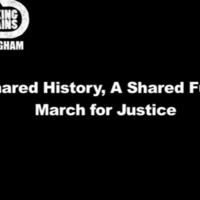
A Shared History, A Shared Future
A Shared History, A Shared Future was a series of projects led by Birmingham Libraries to engage with different communities within Birmingham. The project as a whole identified archival materials, local historical documents and music with an emphasis on the diverse multicultural nature of historical and modern indentured slavery, and how it relates to everyday lives in Birmingham. Over 1000 participants from schools and community groups took part in over 150 workshops to create stories, artwork, banners, protests, games, films, dances, drama and performances. A resource pack, the liberty box, was produced to encourage community groups, youth groups and others to explore the issues of slavery. In August 2007, the project organised the March for Justice in Birmingham city centre, a recreation of the Quaker and philanthropist Joseph Sturge's march against slavery in August 1838. The day included an anti-slavery fashion show, a limbo performance, storytelling, African drumming, and a Slavery Question Time Special hosted by an actor representing Olaudah Equiano.
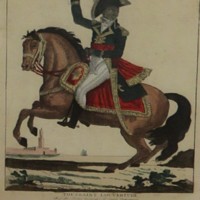
Freedom Think Tank
Freedom Think Tank was a time limited Black-led voluntary group established to influence the agendas of organisations in the North East commemorating the bicentenary of the abolition of the slave trade. The group also organised commemorative events, focusing on themes of promoting social solidarity and raising awareness of the participation of Black people in abolition.
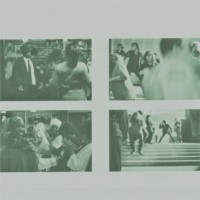
Down at the Bamboo Club: Film, Participation and Re-enactment
Down at the Bamboo Club was organised by Picture This, an artists' film and video commissioning agency in Bristol. The project was an exhibition of artists' video exploring Bristol's cultural histories and ideas of legacy. Contemporary artists worked with community groups to develop films and events that used the device of re-enactment to explore subjects such as community relations, identity, the legacy of slave trading in the city and histories of division and solidarity. One such film was 'Bamboo Memories' by Barby Asante. The Bamboo Club was a legendary Bristol nightclub in the 1960's and 1970's which holds great significance for older generations in the city as a place where first groups of African-Caribbeans socialised with white Bristolians.
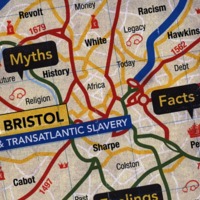
Myths, Facts, Feelings: Bristol and Transatlantic Slavery
The project to produce the booklet Myths, Facts and Feelings: Bristol and Transatlantic Slavery began in 2007. The Bristol Race Forum aimed to tackle some of the sensitivities, misunderstandings and popular opinions about the subject, and particularly in the Bristol area. The book's development went through a number of stages until it was published in 2012. The booklet and accompanying website for schools and communities across Bristol were produced with a view to sharing lessons from Bristol's past, and as a driver for future debate, activism and challenging prejudices. The contents were developed out of workshops with young people from the African Caribbean community and visits to community groups across Bristol.
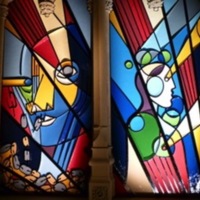
Reconciliation Reredos
The Reconciliation Reredos project to develop a major public artwork was the response by Saint Stephen’s Church in Bristol city centre to a complex historical legacy. St Stephen's was the harbour church which benefitted from merchant’s donations, which effectively ‘blessed’ slave trade ships leaving the port, and which served as the burial site for Africans living in Bristol in the era of the transatlantic slave trade. The project involved the commissioning of a new altarpiece: four pieces of contemporary artwork exploring the mercantile connections that built the city of Bristol were created by artist Graeme Mortimer Evelyn, transforming the stone-carved Victorian Reredos housed in the church since 1875. A community learning programme engaged groups of people from the city through workshops, forums and events around the four focus concepts: Creation, Imago Dei (the Image of God in humanity), Reconciliation and Hope.
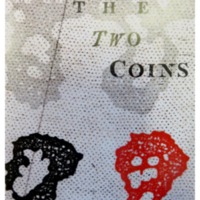
The Two Coins
A bronze statue of the slave trader Edward Colston was erected as a memorial in Bristol city centre in 1895. The monument and the memories it evokes of Colston's trading in enslaved Africans is frequently used as a point of reference for Bristol's contribution to the transatlantic slave trade. The Two Coins is a visual sculpture and moving image installation created by artist Graeme Mortimer Evelyn to revolve around such monuments. The installation aimed to present an unprejudiced historical legacy while highlighting collective responsibility to prevent forms of 21st century slavery.
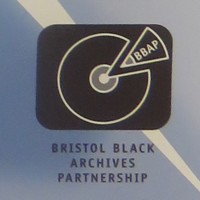
Bristol Black Archives Partnership
The Bristol Black Archives Partnership (BBAP) was set up to collect, protect and make available the heritage of Bristol's local black history. The partnership involved communities, heritage organisations and academic organisations coming together to collect and make accessible the archives - films, photographs, documents and objects - that reflected the experience and contribution of black people in Bristol. BBAP aimed to provide learning resources for a better understanding of Bristol's multicultural history: the 'Me, We, Making History' calendars celebrated local black achievers; 'My Legacy Journal' was made available for African-Caribbean people to record their own family identity, history and stories. A Black Bristolians Teaching Pack was produced, alongside a travelling exhibition based on the project's research entitled 'The Black Presence in Bristol - 16th Century to the Present Day'.
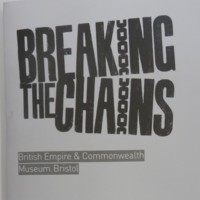
Breaking the Chains
Breaking the Chains opened at the British Empire and Commonwealth Museum to coincide with the bicentenary, and told the story of the British transatlantic slave trade and its abolition. Developed in partnership with Bristol City Council's Museums, Galleries and Archives' Service, the exhibition used artefacts, film and testimony to challenge perceptions about Britain's involvement in the slave trade and its legacy today. It featured a multimedia gallery of digital memories and feelings on the contemporary legacies of the slave trade; interactive sound stations to see and hear personal testimonies and the power of black music; and the ‘Me deya’ gallery, led by Firstborn Creatives, a collection of work from artists and communities who wished to share their creative pieces about the legacies of the slave trade. Associated events included African music for children, community dance events and public debates.
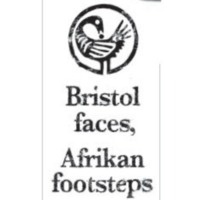
The Adisa Project: Bristol faces, Afrikan footsteps
The Adisa project gave a group of 20 young people of African and African Caribbean heritage the chance to investigate their roots both in Bristol and Africa. The group researched the history and legacies of Bristol's involvement in the trade in enslaved Africans, and its impact on one African country: Ghana. This was a community partnership project in collaboration with the Bread Youth Project, Full Circle Youth and Family and the Mill Youth Centre. The group opened their own exhibition, 'Afrikan Footsteps' at the City Museum and Art Gallery, after a two-week research trip to Ghana to learn about the country's history and culture. The exhibition included short films made by the participants; a Quotes Wall, taken from young people’s interviews with members of their local community; a wall of their personal heroes; a photographic exhibition of their trip; and 'Ma’afa Journey', a film recording their personal reactions to places visited in Ghana.
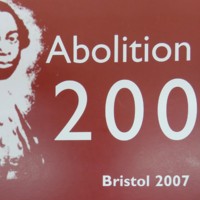
Abolition 200
Bristol was major trading port for the transatlantic slave trade in the 18th century. The city of Bristol marked the bicentenary of the Abolition Act with more than 100 events across the city - exhibitions, plays, debates, talks, concerts - under the umbrella organisation Abolition 200. In January 2007, city leaders signed a declaration of regret for the city's role in the trade. Over the weekend of 24-25 March, bells rang out across the city and a Service of Remembrance and Reconciliation was held at Bristol Cathedral, organised by a partnership of the Cathedral and the Council of Black Churches. 2007 was themed as the Year of Black Achievement, aiming to bring better provision of black heritage resources to schools in Bristol, with a particular focus on black attainment. Over 30 creative community projects were funded by Abolition 200 - including art installations, educational projects and community theatre - to reflect the themes of education, commemoration and legacy.
Featured here are some of the events from Abolition 200.
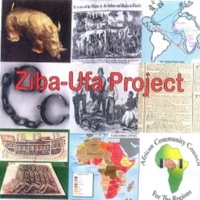
Ziba-Ufa
The phrase 'Ziba-Ufa' is Kiswahili for 'Closing the Gap'. Led by ACCR - the African Community Council for the Regions - this project aimed to close the gap between past and present by undertaking research from an African perspective. Blind Memory was a multimedia exhibition of images of Africa, slavery and resistance held at the Drum Arts Centre in Birmingham. The exhibition looked at memories relating to the transatlantic slave trade and how they affect beliefs and feelings; one of the aims of the exhibition was to rectify the amnesia and blind memory which many people are perceived to have in relation to slavery.
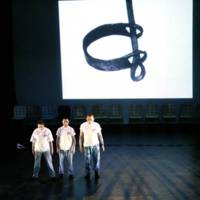
Remembering Slavery Freedom Performance
Remembering Slavery 2007 involved museums, galleries and other cultural organisations across the North East of England in a programme of exhibitions, events, performances, lectures and activities to explore the themes of slavery and abolition, and identify connections with the region.
The Freedom Performance was a collaboration between Tyne and Wear Museums, Dance City (a dance school in Newcastle), professional artists, performers and community and youth groups from across Northumberland and Tyne and Wear. The performance was inspired by music, dance, literature and objects relating to the slave trade and its legacy.
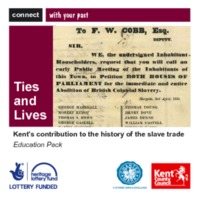
Ties and Lives: Kent and the Slave Trade
Ties and Lives: Kent and the Slave Trade was a project run by Kent Archives in collaboration with Creative Partnerships Kent and the educational charity Music for Change. It aimed to show how the county’s historic collections could be used by young people to support their education, particularly on contemporary issues. An education pack provided a range of sources, research and information for secondary schools about the abolition of slavery. Music for Change artists visited schools in the county and through performance workshops encouraged students to interpret stories found in the archive and local history collections and explore the impact of the transatlantic slave trade and the abolitionist movement on the past lives of Kentish people. There was a particular focus on music and dance originating from the traditions of enslaved peoples.